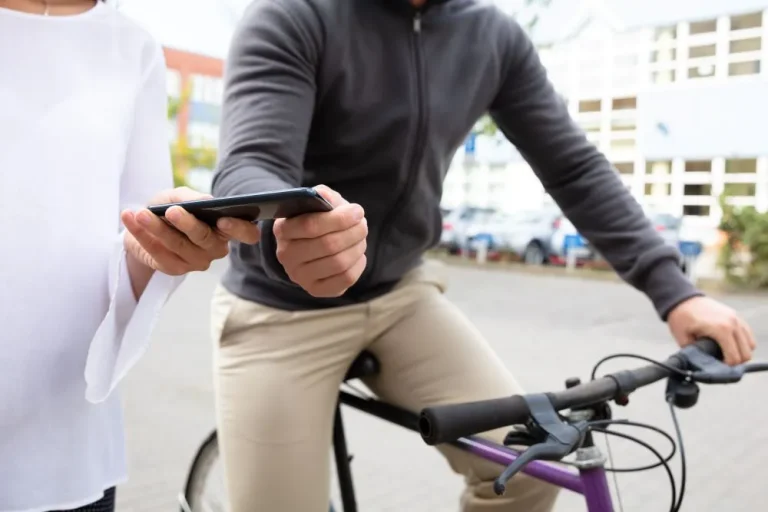Imagine walking down a busy city street, minding your own business, with your mobile phone in hand. Perhaps you’re following Google Maps or searching for your train ticket. When suddenly someone zooms past you on a bike and snatches your phone in the blink of an eye.
Do you chase after them? It’s unlikely you’ll catch up, especially once you’re over the initial shock. But with how much personal data is stored on our phones nowadays, it could be a much more costly crime than the price of a new phone for you.
Whether you’re a big city resident, or travelling this summer, anyone could be vulnerable to this kind of attack. Phone theft is rising at a rapid pace, with criminal gangs exploiting the lucrative value of all our personal financial information.
Why do thieves want our phones?
With a new smart phone going for around £250-500, and resale value likely less than that, what’s really in it for these criminal gangs? There’s been large increases in phone theft in the last year, as criminals know they can generate much more if they can compromise your security settings and monetise your data.
For criminal gangs, phone theft requires less effort and violence than other organised crime, with a lower chance of getting caught, and lower penalties if they even do. The amount of money gangs can make is potentially much higher, especially if they can use your phone to crack your digital life open.
Think what’s stored on your phone; banking apps, emails, passwords, Apple Pay, maybe even screenshots or photos of important personal information. All a thief needs to do is turn off your stolen phone’s location, so you can’t trace it, and start accessing your accounts and changing passwords.
And even with two-factor authentication protections in place, this will likely come through to your phone via text or email. So the thief can log in unimpeded and get unlimited access to your data. They can start stealing your money, and even applying for loans and overdrafts in your name. Thieves can also start targeting your contacts, sending phishing scams and other dodgy tactics – maybe even impersonating you and extracting money from your friends and family.
As for the phone itself, once the sim is locked and the phone reported stolen, it cannot be used on any UK networks. It will alert as stolen if anyone tries to pawn or sell it to a reputable second-hand shop. But that doesn’t make it worthless. Barred handsets can be shipped overseas and used on foreign networks with a new sim card. So let’s tot up those totals:
- The handset = £200
- Your data = Depending on your financial profile, potentially thousands
- An endless web of scam targets = Priceless
How bad is the phone theft spate?
The latest official figures for England and Wales reveal that police are dealing with the highest level of “theft from the person” offences recorded in two decades. This type of crime, where items are taken without the threat or use of violence, includes pickpocketing as well as snatching. It declined during the pandemic, but police records show an 18% increase in the past year; according to Crime Survey data, one in three items stolen is a phone.
London is the epicentre for phone theft. Metropolitan Police data indicates a phone is stolen every 10 minutes in the capital – and this is based on those who report the crime; many people don’t. Mobile phone theft from the person reports increased by 33% in the year to January 2024.
UK Finance reported a record high total lost from mobile banking fraud in the first six months of 2023, of £18.7M. The number of cases also reached a new high, up by 32%, with an average loss of £2,314 per customer.
What tactics do phone thieves use?
Look up and down any busy street, and huge numbers of people walk around with their phones unlocked in their hands, on display. They might have their headphones in and not be aware of their surroundings — but the criminals are paying close attention.
The data doesn’t tell us how phones are stolen, but many victims have reported ‘bike swiping’ or ‘snatching’, where an e-bike or scooter rider has zoomed past and simply grabbed their phone. It’s fast, efficient, and gives the target no time to see the warning signs, nor react, while the thief makes a quick getaway. There’s also pickpocketing, popular in tourist hotspots where people are easily distracted by their surroundings.
And even if your phone is locked, don’t be so sure that your data is protected. ‘Shoulder surfing’, and even covert filming means thieves can obtain your passcode and pins by spying on you before stealing your phone, knowing the valuable keys to unlock apps and other services on your device.
Even once you’ve reported the crime, and got a replacement handset with your number, be prepared for a barrage of phishing attempts. You may get phone calls, some automated and some from ‘real’ people, claiming to be from organisations you hold accounts with wanting to help “reset your security details”. It’s incredibly unsettling, and easy to fall for, given the circumstances that your data has indeed been compromised.
How can you protect yourself from phone thieves?
As with any crime, it’s important you contact the police to report the incident. But be prepared for disappointment; just 2% of reported phone theft in London resulted in the device being recovered.
The best form of protection is prevention. But not having your phone on display in public is easier said than done. We all use our devices for travel, to pay, listen to music, or catch up on texts and emails while we’re on the go.
Be especially vigilant near train, underground and bus stations. These are prime hunting grounds, as we fumble for our tickets and work out where to head next using a navigation app. You’re easily distracted in this moment, so a thief could easily snatch your phone.
Storing your driving license and multiple bank cards in one handy phone case is a further gift for thieves. Yes, it’s convenient, but if you were to lose one, you’ve lost all your most valuable items in one fell swoop. Keep your bank cards and ID separate from your mobile.
As well as a more compact phone case, consider a privacy screen for your device. These are applied to the face of your device as an anti-spy layer that limits the viewing angle of your display and could prevent ‘shoulder surfing’. They can also prevent scratches, so it’s a win-win!
And finally, consider your ‘cyber hygiene’. Do you use the same password for virtually everything? You’re not alone. Around a fifth of us use the same password for multiple sites, and also include a significant date or pet’s name, making us even more hackable.
The best passwords are unique, lengthy, and complex, i.e. a mix of numbers, symbols, upper and lowercase letters. Here’s a handy guide, which shows how simple changes like replacing letters with numbers and symbols makes your passwords harder to crack.

Can you insure your mobile phone?
In short yes – your phone can fall under your contents insurance, or you can have specific gadget insurance. But it’s important you read the fine print and understand exactly what’s included and how you’re covered.
Mobile phones can be an optional extra as part of contents insurance, under unspecified items. But it must be within the single article limit, alongside any other items you or your family carry outside the home. You may need to have a specific Personal Belongings cover option for items you take outside the house – as we often do with our phones!
Having the right gadget insurance gives you peace of mind that, if anything does happen, you know you’re covered for the cost of repairs or replacement. As not all policies are the same, Howden Insurance can help you compare the various cover options to work out what’s the best fit for you. We’ll help make the process simple and easy, doing the heavy lifting so that you don’t have to.
Find your nearest Howden branch, and speak with our team in person, or over the phone.
Sources: Financial Times, BBC News, Android Authority, The IET

